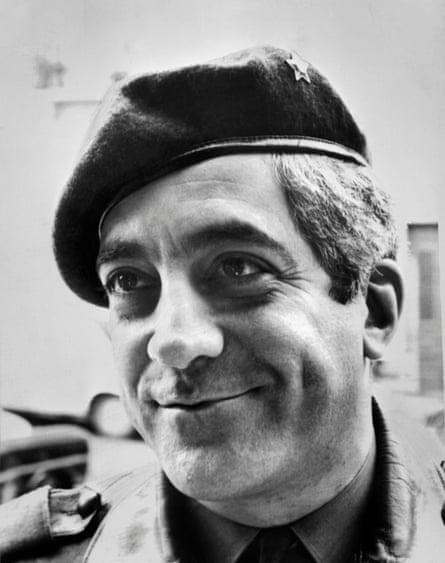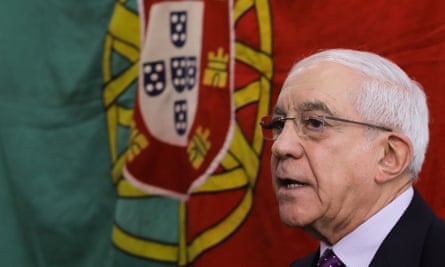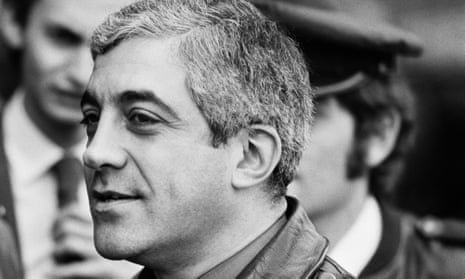Otelo Saraiva de Carvalho, who has died aged 84, was a disillusioned army captain who became the mastermind behind the coup that sparked Portugal’s Carnation Revolution, so-called because the people placed red carnations in the barrels of the soldiers’ guns.
The coup on 25 April 1974 toppled 48 years of authoritarian fascist rule and brought about the transition to democracy. With a population of nine million, of which a quarter of adults were illiterate, Portugal was the most impoverished country in western Europe.
Carvalho was a member of a group of army captains, the MFA (Movimento das Forças Armadas), who were both sickened by the wars they were losing in the African colonies and inspired by the ideology of the independence movements they were fighting against. Carvalho, although politically inexperienced and of humble origins, was a remarkable strategist and a leader of men who paid ruthless attention to military detail, and it fell to him to organise the coup.
It unleashed a tsunami of activity. The first housing occupations took place on 28 April. Within a week of the coup, there were 97 strikes – more than had occurred in any one-year period in the old regime. Some 40% of strikes called for saneamento – the purging of those who had links to the dictatorship. Hundreds of workplaces were occupied and, over the next 19 months, vast tracts of land were taken over by workers.
People set up and built creches, health centres, community organisations and cultural centres. Democracy from below flourished. The European left flocked over to join in and celebrate the renaissance of revolutionary ideas. I went to work in Portugal on behalf of the International Socialists as a political organiser. In my view this became the most powerful, inspiring example of a revolutionary process to have taken place in Europe since the second world war.

With General António de Spínola as interim president, the newly created first provisional government, which included the Communist and Socialist parties, wanted to stamp on the strike waves, the occupations of houses and above all the rebellions by rank-and-file soldiers, who needed a commander committed to discipline and hierarchy.
Hence Carvalho, promoted to brigadier, was given command of a special military force, Copcon, charged with establishing discipline in the armed forces and maintaining law and order among civilians.
However, it turned out that Carvalho was not to be their man. While on occasion Copcon did thwart protests, at other times it mediated, and in the process was won over by the struggles of the people. There are stories of squatters taking over empty houses, alleging they had the backing of Copcon.
Carvalho, the bluntly spoken military strategist, somewhat naive politically, emerged as a flamboyant, charismatic and much-loved leader, blessed with a wonderful sense of humour. He became widely known by his first name, Otelo.
Otelo needed a base, an army in addition to Copcon, and came to favour more and more the notion of workers’ and soldiers’ councils. He said in a radio interview: “I see no danger at all in these congresses or councils. I consider them, like neighbourhood committees, to be the essence of the Portuguese Revolution. I consider them similar to the Russian Soviets of 1917.”
In the summer of 1975, supported by the MFA, many assemblies emerged and were seen as the highest political expression of popular power. In June, the first such assembly was held at Pontinha, the same barracks from which Otelo had organised the coup. This brought together more than 50 neighbourhood and 26 workplace committees. Possibly 100 such assemblies were convoked.
Dependence on Otelo and the MFA was to become one of the fatal flaws in the workers’ movement. A demonstration in defence of Radio Renascença and the República newspaper, both under workers’ control, illustrates an aspect of this. Several thousand helmeted workers from the Lisnave shipyard attended, having been promised that Otelo would be there.

A worker from Lisnave later told me that while waiting for Otelo, “they were crying out for him, and people did not know what was going on and there were rumours, ‘he is coming’, ‘he is coming’, ‘he is in jail’, rumours of this and that. In the end we found out that Otelo was just at a mighty nice banquet somewhere with a Bulgarian attache.”
On 25 November 1975, a group of reformist officers, part of a new and small elite military unit, quenched, with remarkably little bloodshed, a number of insubordinate barracks. The main object was to abolish Copcon. A myth had been created, still repeated, that Otelo was organising a far-left coup. This was not the case; ever unpredictable, on that day he remained at home, incommunicado until noon. In his words: “I decided not to resist; this would have led to civil war.”
Fundamentally, the Carnation Revolution collapsed from exhaustion, an over-reliance on the MFA and a lack of an alternative. The fear of fascism skewed the movement and resulted in an underestimation of the capacity of capitalism to adapt and reform.
The same people who had been involved in direct democracy massively participated in the “bourgeois” elections of April 1975: turnout was 91.9% (after 48 years of dictatorship), with 38% for the ostensibly left-leaning Socialist party, supporters of which organised the counter-revolution seven months later. Nonetheless the struggles of the working-class and the associated social movements led to massive social reforms, such as the creation of a health system similar to the NHS.
Carvalho was born in Lourenço Marques, now Maputo, capital of Mozambique. His father, Saraiva de Carvalho, was a civil servant; his mother, Fernanda Áurea Pegado Romão, was a railway clerk and theatre-lover who named her son after the character from Shakespeare. Otelo entered the Military Academy in Lisbon in 1955 at 19. In 1960 he married a classmate from school, Dina Afonso Alambre, with whom he had two daughters and a son.
He served in Angola, fighting the guerrilla war for independence (1961-63 and 1965-67). He was posted to Guinea (1970-73), and was a captain under General Spínola.
Immediately after November 1975, Copcon was disbanded and Otelo was imprisoned for three months. The following year he ran for president. Otelo had come to believe fervently in direct democracy. He said: “We should harness the spontaneity and creativity of the masses, which gives them the ability to solve their own problems. I saw, during the Portuguese Revolution, the power of this creativity in the streets and the towns and the fields.”
Although Otelo obtained only 16.5% of the vote, this was double that of the Communist party candidate. When he stood again in 1980, winning only 1.5% of the vote, there could be no doubt that times had changed.
In 1985 he was arrested, accused of being a leader of FP-25, a far-left terrorist group responsible for a series of killings and bomb attacks. Although he always denied any involvement with the group and its actions, he was sentenced to 15 years in prison. While in Caxias prison, he met and fell in love with a divorced prison worker, Filomena Morais. He served five years before being released and was later granted an amnesty and pardoned.
On release he negotiated an open relationship with his wife, Dina, and with Filomena, splitting his week between them, an arrangement that continued to attract publicity.
Dina died last year. He is survived by Filomena, his son, Sergio, and his daughter, Paula. His other daughter, Claudia, died in childhood.

Comments (…)
Sign in or create your Guardian account to join the discussion